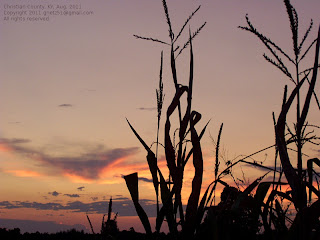Corn, sky, and Johnsongrass.
Do you see the stalk of Johnsongrass in this photo, growing nearly as tall as the cornstalks? Grassy weed, weedy grass -- either would be a good description for Johnsongrass. The Commonwealth of Kentucky and at least 17 other states call it a noxious weed!

6 comments:
I was wondering what that stuff was called that I keep seeing in the fields and other places, and now thanks to you I know.
This is such a lovely photo. It really could be a postcard from Kentucky.
Wishing you and yours blessings always. :)
Hi, Stitchy. I know Johnsongrass well from trying to eradicate it in my own garden. But it is just one of the tall grassy plants you might see in western KY.
The UK extension service mentions big bluestem, Indiangrass, and switchgrass as very tall native grasses that are good for grazing. Of these three, I would only be able to identify big bluestem, if I saw it. Native cane also looks kind of grassy -- the buffalo thought so, too!
My dad once asked an elderly black man who lived nearby how to get rid of Johnson grass. The reply: 'You can't really get rid of it; you just kind of have to move away from it." Pretty much the truth!
Elaine, I agree completely with your dad's neighbor. Moving away is the only way I'm ever going to get rid of the Johnsongrass -- and the Bermudagrass too.
I love the photo. Is Johnson grass harmful to cattle?
After saying that johnsongrass makes good forage in pastures of the Southern Great Plains, this website comments:
"Johnsongrass is on the noxious weed list in several U.S. states (including Oklahoma) and has even made the list of the 10 most noxious weeds in the world. Johnsongrass can accumulate nitrates during the summer if exposed to several dry, cloudy days in a row. It can also produce prussic acid (hydrogen cyanide) after stressful conditions such as drought, freezing weather or exposure to a herbicide that kills grasses. If your johnsongrass is subjected to any of these conditions, keep cattle away for about a week to allow the prussic acid to dissipate."
Source: http://www.noble.org/ag/forage/johnsongrass/
Post a Comment